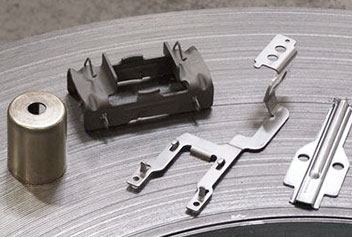Progressive stamping is an accurate and cost-effective method for automated metal forming that can achieve high production volumes without compromising product quality. By incorporating several steps into one metal forming process, progressive die stamping allows manufacturers to produce complex goods using the best metals for stamping without straining the substrate or interrupting production.
Based on the complexity of the application, operators can bend, punch, press, and form the metal as needed to create a complete shape. Utilizing one progressive die set is more efficient than using multiple tooling. This efficiency makes progressive stamping beneficial in aerospace, automotive, construction, food and beverage, medical, mining, military, electronics, and other industries requiring high-speed, high-volume production.
Factors to Consider in Material Selection
Manufacturers can use brass, aluminum, copper, and various types of steel in the progressive stamping process. However, consider these factors and associated trade-offs to select the best metal for stamping.
1. Material Cost and Budget Considerations
Cost can be a determining factor when selecting a material for metal stamping. For instance, materials with lower performance characteristics cost less than metals that offer high strength, corrosion resistance, and formability.
Manufacturers must balance the required material characteristics with the overall cost of the raw material to ensure the end product is cost-effective, functional, and within the project’s budget.
2. Workability and Formability of Material
The machinability of the metal determines the smoothness and quality of a product’s surface finish. Metals that are easy to cut or shape are typically more affordable to process, and metals with poor machinability may require additional finishing or specialty tools to achieve the desired result.
Likewise, materials with good weldability require minimal effort to produce defect-free products, while metals with poor weldability may require process modifications and special preparation steps.
3. Strength and Durability Requirements
The selected material must have adequate tensile strength to withstand the mechanical stresses encountered during use. Tensile strength is determined by measuring the amount of pulling or stretching a metal can endure before it begins to break, crack, or experience irreversible deformation. Tensile strength measurements indicate how well the stamped part will perform when exposed to various levels of force and tension.
4. Environmental Resistance Needs
Selecting a metal with inherent corrosion resistance is strongly recommended for products that may encounter exposure to atmospheric oxidation, chemicals, moisture, or other corrosive substances. How much corrosion resistance is needed will depend upon the intended application and environment the final product will encounter.
5. End-use and Application of the Finished Product
A crucial factor to consider when selecting the best metal for stamping is the material’s ability to adequately support the application and end-use of the finished product.
For instance, copper is commonly used for electrical connectors and components due to its high electrical and thermal conductivity. Stainless steel, however, is the preferred choice for plumbing components due to its durability, temperature resistance, and corrosion-resistant properties.
Common Materials Used in Progressive Stamping
The following materials offer varying properties and characteristics for use in a wide range of applications:
- Stainless Steel: Stainless steel offers exceptional mechanical and engineering properties that include corrosion resistance, magnetism, and an attractive, smooth finish that is easy to maintain. It is best suited for food handling and medical applications.
- Carbon Steel: Carbon steel is a highly durable carbon and iron alloy offering superior strength and design flexibility. The material is cost-effective and compatible with many metal-forming processes. Zinc, chrome, or nickel coatings can enhance carbon steel’s corrosion resistance.
- Beryllium Copper: The non-ferrous copper alloy is commonly used for bearings, aircraft engine components, springs, and other stamped parts that require high-stress tolerance. The material offers corrosion resistance, thermal conductivity, electrical conductivity, and resistance to stress relaxation.
- Copper: The soft, malleable alloy is a preferred choice for metal stamping due to its corrosion resistance, easy-to-clean surfaces, and ductility. Copper proves beneficial in food processing and medical applications.
- Brass: The alloy contains varying amounts of zinc and copper, providing various proportions of malleability and hardness. It is a suitable material for bearings, locks, gears, and valves. Brass offers exceptional versatility, thermal and electrical conductivity, and visual appeal for decorative items such as ornamental hardware.
- Aluminum: The silvery-white, soft metal offers a high strength-to-weight ratio, excellent formability, resilience, and an attractive finish. It is best suited for lightweight stamped components and thermal and electrical conductors.
Plating and Coating in Progressive Stamping
Plating stamped metal components can enhance the parts’ properties, such as:
- Bonding
- Coloring
- Corrosion protection
- Decorative use
- Electrical conduction
- Lubricity
- Wear resistance
Plating material finishes include copper, nickel, silver, gold, zinc, palladium, tin, palladium-nickel, and tin-lead. Metal stampings can be barrel-plated, reel-to-reel plated, vibratory plated, rack-plated, or selective-loose-piece plated.
Coating materials can enhance product durability and functionality and be applied through an electrostatic spray or fluidized bed dip process to meet the application demands.
Progressive Stamping with American Industrial Company
American Industrial Company is a leading provider of metal stamping, assembly, and tooling services. We invite you to explore our resource library to learn more about the importance of careful material selection in the manufacturing process.
Contact us for further insights, or request a quote to collaborate with us on your next project.



